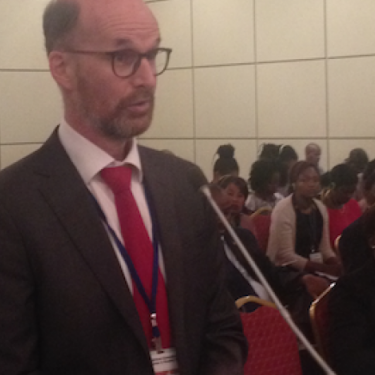RSF unveils “shadow report” on press freedom in Eritrea

Reporters Without Borders (RSF) accuses the Eritrean government of a complete denial of reality in its first-ever report to the African Commission on Human and Peoples’ Rights and announces that it has submitted an alternative “shadow report” with a much darker assessment of the state of press freedom in Eritrea.
The government’s “initial national report” covering the period from 1999 to 2016 has to be seen to be believed. It says: “The fundamental principle in the National Charter, Eritrea’s Constitution of 1997 and the national codes and proclamations is that citizens have the right for lawful expression and opinion without interference.”
The Eritrean government will present this report to the African Commission on Human and Peoples' Rights on 28 and 30 April during the Commission’s 62nd ordinary session in the Mauritanian capital of Nouakchott.
RSF’s shadow report, which was written by its Swedish section and was sent to the Commission, emphasizes the gulf between the situation described by the Eritrean authorities and the reality on the ground.
“While the Eritrean government’s report is a first, it nonetheless constitutes a complete denial of reality,” said Arnaud Froger, the head of RSF’s Africa desk. “Freedom of expression and information is non-existent in Issayas Afeworki’s dictatorship, which is still Sub-Saharan Africa’s biggest jailer of journalists. Seventeen years after Eritrea shut down all independent media outlets, it is time to free the many journalists who are detained arbitrarily.”
Is Dawit Isaak still alive? Isaak is a Swedish-Eritrean journalist who co-founded the newspaper Setit and was awarded UNESCO’s Guillermo Cano World Press Freedom Prize in 2017. Like many other Eritrean journalists, he has been detained for the past 17 years without ever being brought before a court, charged or tried.
He has had no access to lawyer and his family has had no news of him since 2005. He was arrested on 18 September 2001 along with ten other politicians and journalists who were openly questioning the regime’s increasingly authoritarian tendencies.
When asked by Radio France Internationale about “political prisoners” in an interview in 2016, Eritrea’s foreign minister said “all of them are alive” and that they would be tried “when the government decides.”
Eritrea continues to be ranked second from last, 179th out of 180 countries, in RSF's latest World Press Freedom Index. A handful of foreign reporters were allowed access to the capital, Asmara, under close escort on 2016 but only Radio Erena, a Paris-based radio station run by four Eritrean exile journalists, is able to provide independently reported news and information about Eritrea.
Read our shadow report about press freedom in Eritrea here



